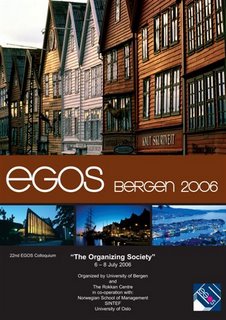
Spent four days at the European Group of Organization Studies (EGOS) conference in Bergen. There is a standing working group centered around Strategy as practice, that is, a new tradition of strategy research centered around what strategists in organizations do, that is, not primarily on what they should be doing (this of course is a gross simplification. This working group has been my home base for many years and it contains some of what I (and also some other people) regard as the most interesting kind of strategy research right now.
Scientific conferences are interesting, socially speaking. I have always enjoyed EGOS because the atmosphere is so open, friendly and encouraging. It is as if all participants acknowledge the notion that while during the academic year, we struggle over money, publications, administration and who knows what, the conference is a venue for celebrating science and our community of scientists. PhD students get the attention of, and encouraging feedback from, senior colleagues, everybody is interested in the kind of research you do and considers your work valuable.
There is, however, even at EGOS, always an implicit social order, maintained by various tacit tools and methodologies. Most importantly, there are degrees of insidership. Some people have published more and have been participating in the discussion longer to have created all sorts of norms of what is regarded as a proper topic or sentiment within a specific dialogue. I guess this is all about building a scientific paradigm, even scientific knowledge, and a drive to get more recognition certainly can be a positive motivational force for a junior colleague (such as myself). However, there are times when young people are crushed and pushed aside and this is regrettable.
I was impressed by the way the senior colleagues at our present working group invited the junior ones to participate. Seniors openly sought the company and collaboration of the juniors, seeking for their viewpoints, offering feedback, encouragement and suggestions on their work. This resulted in a very nice win-win situation where there was respect for the founding work by the senior people, who in turn invited dialogue from the junior colleagues. This dialogue in turn resulted in a feeling of progress being made, research thriving.
This makes me think of a lecture way back in 1994 when I was just beginning my undergrad studies. I attended the lecture on otherness by Esa Saarinen, a philosopher who was largely responsible for reinvigorating public interest in Finland during the 1990's. At this lecture he offered two "otherness principles". "When I'm old and grey, and you find me at a party somewhere", he suggested, "I want you to thank me for offering these two". "I better pay attention", I thought. This is how I remember the two otherness principles:
1. Every person is intrinsically afraid of the other
2. Every person is intristically most motivated to discuss his or her own affairs.
You can view the principles, which I later found to be derived from the work of some fundamental continental thinkers, from multiple angles. They can be the foundation for cynical exploitation and "networking", the domination of others through exploiting their vanities and fears. However, I don't think how they were meant. I think they were meant as personal challenges to be overcome. To not to be intrinsically afraid of others. To treat their interests as intrinsically interesting. I have worked on these principles as challenges and there is certainly more work to be done, especially on the second one.
Watching the senior people at our working group perform this year really provided an inspiration. The way they treated their juniors, seeking their company, inviting them to join, and treating their research as valuable and interesting was a personal inspiration.

1 Comments:
In my undergraduate years, at Trinity College (part of the Arts and Science Faculty at the University of Toronto), we met a lot of (Anglican) divinity students. I remember one talking about "preaching" and how parishoners would expect "the voice" -- big and booming in a church full of authority.
This divinity student also told me that using "the voice" isn't every appropriate in everyday counseling, so they're reminded to take a more conversational tone.
I've taken this heart in my own public speaking, and usually try to avoid "the voice" in my conversational style. (I haven't had anyone tell me that they don't like, it, yet .... but I guess anyone that does come to tell me that -- would be doing me a favour).
Post a Comment
<< Home